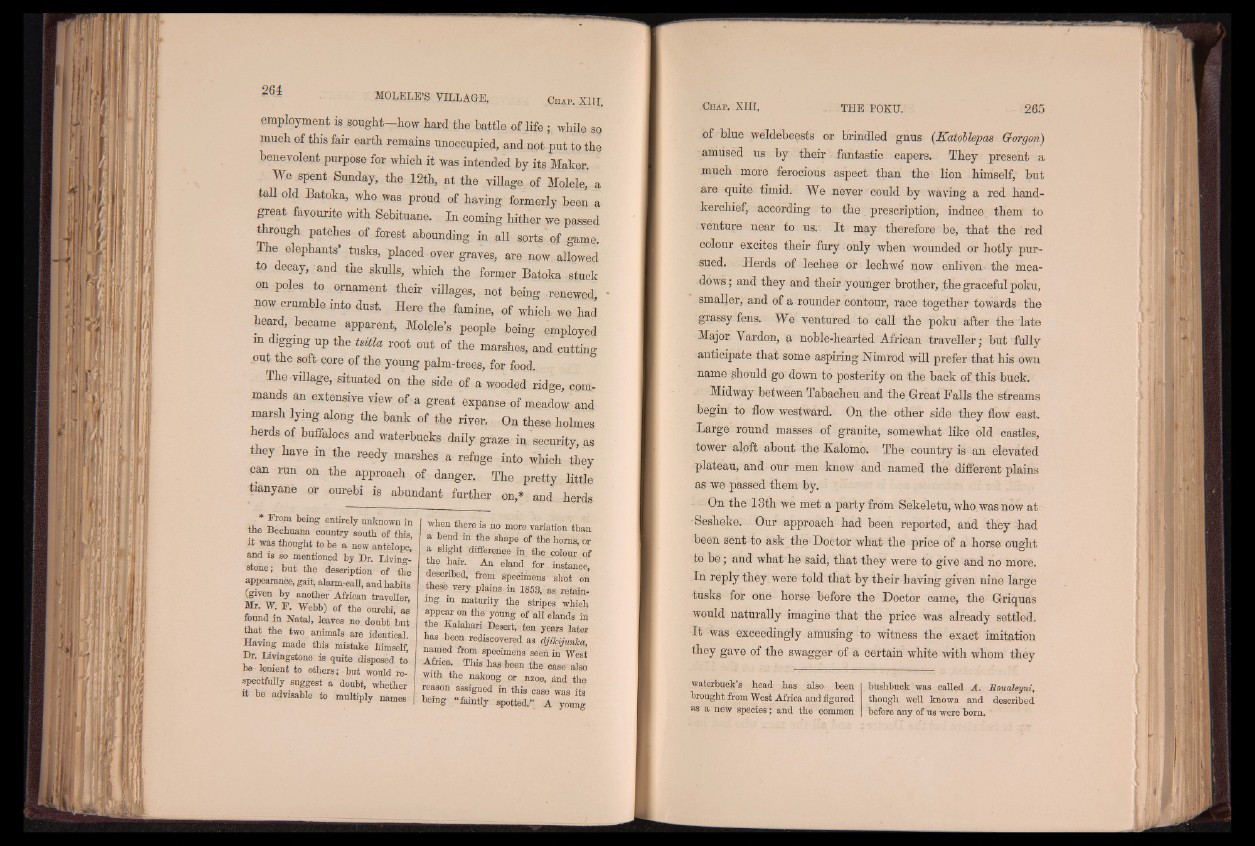
employment is sought—how hard the battle of life ; while sp
much of this fair earth remains unoccupied, and not put to the
benevolent purpose for which it was intended by its Maker.
We spent Sunday, the 12th, at the village of Molele,’ a
tall old Batoka, who was proud of having formerly been a
great favourite with Sebituane. In coming hither we passed
through patches of forest abounding in all sorts of game.
he elephants’ tusks, placed over graves, are now allowed
to decay, and the skulls, which the former Batoka stuck
on poles to ornament their villages, not being renewed •
pow crumble into dust. Here the famine, of which we had
heard, became apparent, Molele’s people being employed
in digging up the tsitla root out of the marshes, and cutting
out the soft core of the young palm-trees, for food.
The village, situated on the side of a wooded ridge, commands
an extensive view of a great expanse of meadow and
marsh lying along the bank of the river. On these holmes
erds of buffaloes and waterbucks daily graze in security, as
t ey have in the reedy marshes a refuge into which they
can run on the approach of danger. The pretty. little
tianyane or ourebi is abundant further on,* and herds
. * From being entirely unknown in
the Bechuana country south of this,
it was thought to be a new antelope,
and is so mentioned by Dr. Livingstone;
but the description of the
appearance, gait, alann-call, and habits
(given by another African traveller,
Mr. W. F. Webb) of the ourebi, as
found in Natal, leaves no doubt but
that the two animals are identical. I
Having made this mistake himself,
Dr. Livingstone is quite disposed to
be lenient to others; but would respectfully
suggest a doubt, whether
it be advisable to multiply names |
when there is no more variation than
a bend in the shape of the horns, or
a slight difference in the colour of
the hair. An eland for . instance,
described, from specimens shot on
these very plains in 1853, as retaining
in maturity the stripes which
appear on the young of all elands ili
the Kalahari Desert, ten years latex
has been rediscovered as djikijunlca,
named from specimens seen in West
Africa. This has been the case also
with the nakong or nzoe, tod the
reason assigned in this case was its
being “ faintly spotted,” A young
of blue weldebeests or brindled gnus (Katollepas Gorgm)
amused us by their ■ fantastic capers. They present a
much more ferocious aspect than the lion himself, but
are quite timid. We never could by waving a red handkerchief,
according to the prescription, induce them to
venture near to us.- I t may therefore be, that the red
colour excites their fury only when wounded or hotly pursued,
Herds of lechee or lechwe now enliven- the meadows;
and they and their younger brother, the graceful poku,
smaller, and of a rounder contour, race together towards the
grassy fens. We ventured to call the poku after the late
Major Yardon, a noble-hearted African traveller; but fully
anticipate that some aspiring Nimrod will prefer that his own
name should go down to posterity on the back of this buck.
Midway between Tabacheu and the. Great Falls the streams
begin to flow westward. On the other side they flow east.
Large round masses of granite, somewhat like old castles,
tower aloft about the Kalomo. The country is an elevated
plateau, and our men knew and named the different plains
as we passed them by.
On the 13th we met a party from Sekeletu, who was now at
•Sesheke. Our approach had been reported, and they had
been sent to ask the Doctor what the price of a horse ought
to be; and what he said, that they were to give and no more.
In reply they were told that by their having given nine large
tusks for one horse before the Doctor came, the Griquas
would naturally imagine that the price was already settled.
It was exceedingly amusing to witness the exact imitation
they gave of the swagger of a certain white with whom they
waterbuck’s head has also been bushbuck was called A. Roualeyni,
brought from West Africa and figured though well known and described
as a new species; and the common before any of us were born.